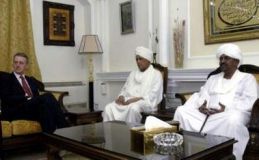Officials step up efforts to find a solution to Darfur deadlock
Oct 18, 2006 (KHARTOUM) — Diplomatic efforts are increasing to break a deadlock over the Darfur conflict, where the United Nations wants to deploy a peacekeeping force that the Sudance government opposes.
 A flurry of visits over the past week by Western and Arab officials comes as concerns rise over new violence and detreriorating humanitarian conditions in Darfur, where a three-year war has already left some 200,000 people dead and 2.5 million displaced.
A flurry of visits over the past week by Western and Arab officials comes as concerns rise over new violence and detreriorating humanitarian conditions in Darfur, where a three-year war has already left some 200,000 people dead and 2.5 million displaced.
U.S special envoy Andrew Natsios is on a weeklong visit, Egyptian President Hosni Mubarak discussed the Darfur crisis with his Libyan counterpart Mouamar Gadhafi on Monday and British Cabinet Minister Hillary Benn made a spot appearance in Darfur’s regional capital of El Fasher.
The moves came as Khartoum’s president and hardline ruling party stood fast in their opposition to an August U.N. Security Council resolution that plans for 20,000 blue helmets to replace the existing African Union peacekeeping force in Darfur.
The 7,000 underequipped and underfunded AU peacekeepers have achieved little in ending the violence in the vast, arid region of western Sudan.
Natsios, whose week-long trip to Sudan began Friday, received a warmer welcome from Sudanese officials than previous visiting US officials; Khartoum appears eager to ease its standoff with the West.
A ban forbidding US officials to travel away from the Sudanese capital was not applied to Natsios. Khartoum has said the ban was was installed because of similar measures against Sudanese officials traveling in the United States.
Natsios on Tuesday went to the south of the country, where he met with Vice President Salva Kiir, came as the influential leader of the former southern rebels voiced his disagreement with President Omar al Bashir over opposing a strong U.N. force in Darfur -reflecting increased dissent within the government on whether to oppose the blue helmets presence.
Meanwhile, Benn, the British minister for international development, said during his one-day visit on Monday that more international troops were needed to bring peace to Darfur. Sudanese authorities did not comment on his call, and have not budged from their position that a U.N. force would be tantamount to a re-colonization of Sudan.
Khartoum has, however, accepted more than 100 U.N. military and civilian advisers joining the AU force.
Jan Pronk, the U.N. envoy to Sudan, has called for a prolongation of the AU mission and its subtle reinforcement by U.N. forces acts as a means of beefing up peacekeeping efforts in Darfur.
Meanwhile, Egypt’s Mubarak discussed how to quell fighting in the violent region with Libyan President Moamar Gadhafi. Some Darfur rebel factions admit they receive support from Libya and have rear bases there.
Both countries are members of the Arab League, which has proposed its own peackeeping mission. The Sudanese government also resisted that proposal, but the Arab League’s opposition to a U.N. force could give the league’s plan more weight with Khartoum.
African presidents from Senegal, Gabon and Nigeria were also expected to meet with the Sudanese president in the coming days to discuss efforts for Darfur, where international aid groups say the humanitarian situation is spinning out of control.
Meanwhile, the Sudanese government says it is making progress in implementing the Darfur Peace Agreement signed in May between Khartoum and one rebel group.
The Sudanese president now heads a new national commission to supervise the implementation of the peace deal, and a plan to begin disarming the pro-goverment Janjaweed militia will be launched within two months, the government says.
The Janjaweed are blamed for some of the worst atrocities against civilians in Darfur and it is not clear how authorities plan to disarm them.
An AP reporter witnessed that several new squads of Janjaweed recently coming to the regional center of El Fasher. Residents say the paramilitary group has clashed with former rebels and looted the main market in recent days.
(AP)
